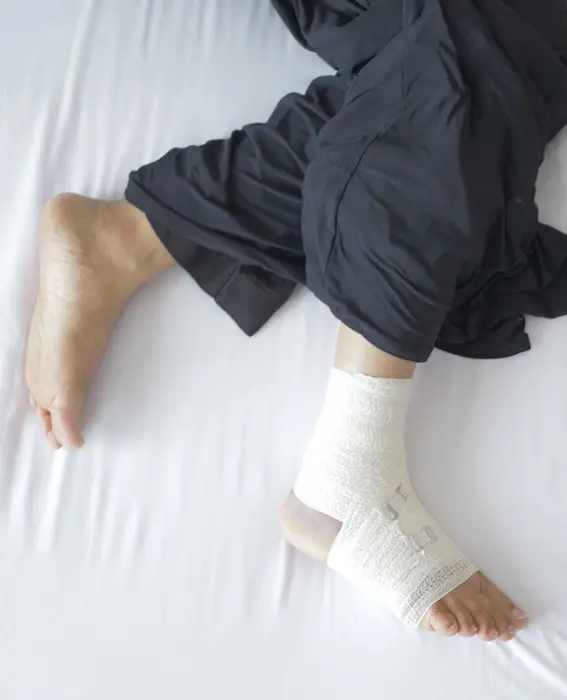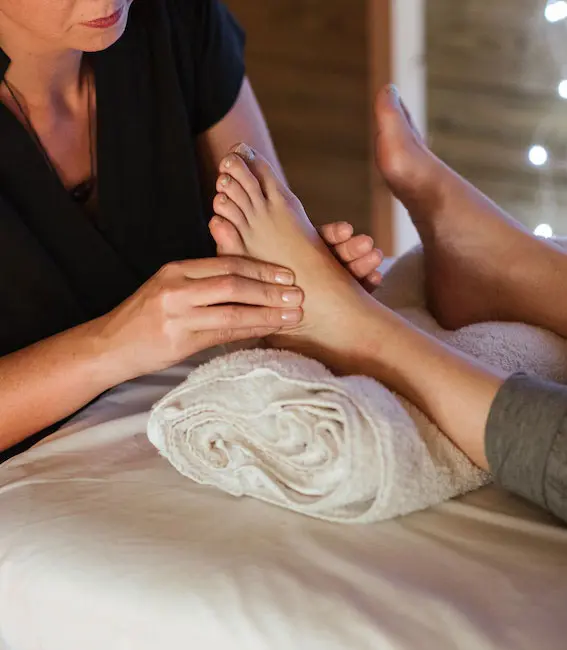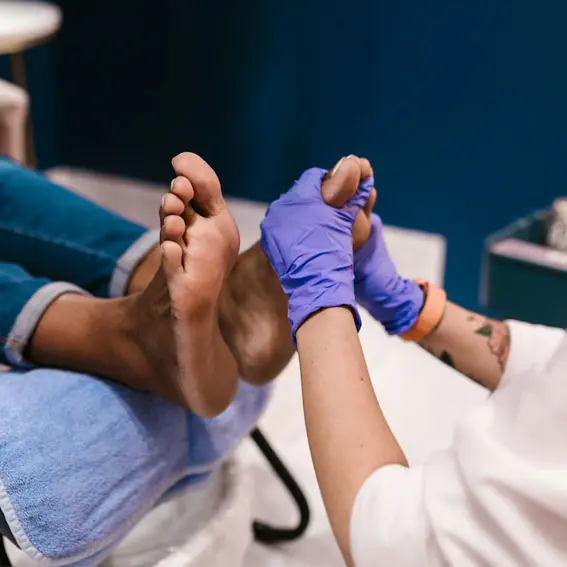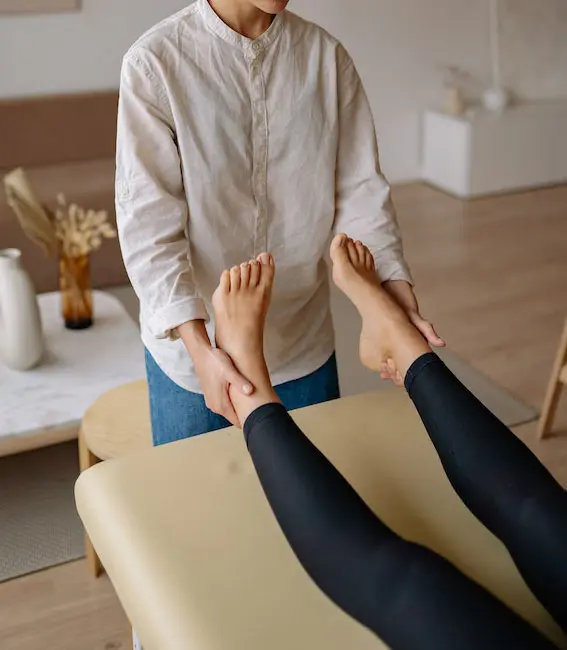Flat Feet Treatment
From St. George to Mesquite, Foot and Ankle Center is the top podiatry clinic in the region, providing excellent patient care since 2016.
Dr. Cameron can handle any conditions causing foot and ankle pain, such as Achilles tendonitis, plantar fasciitis, arthritis, and flat feet. While other doctors may immediately recommend a surgical flat foot treatment, Dr. Cameron will consider the root cause of your flat feet in combination with your unique medical history and lifestyle to recommend the best intervention for you. If you are experiencing foot pain but do not know the cause or are unfamiliar with flat feet, you’ve come to the right place.
What Does Having Flat Feet Mean?
You may have heard “flat feet” but have yet to learn what it means. You may think you couldn’t have that since your feet aren’t flat as a pancake. However, when a doctor says you have flat feet, they are referring to your fallen arches. When your arches collapse, your entire foot’s sole comes into contact with the ground when standing or walking around. This unintended contact can cause minor discomfort or pain and injuries.
Symptoms of Flat Feet
You could be experiencing symptoms of flat feet without even knowing you have fallen arches. In addition to pain or discomfort from walking or standing for long periods, symptoms include:
- Easily Tiring
If your feet or lower legs are fatiguing quickly with your standard daily exercise or activity, you could develop fallen arches. - Swelling
If your feet or ankles are swelling after standing or walking for short periods, flat feet could be the culprit. - Joint Pain or Instability
Knee pain is one of the most significant indicators, as your leg’s alignment will shift when your feet collapse, causing joint mobility issues. You may also experience pain in your ankles, hips, or lower back.


Potential Flat Feet Injuries
While you can experience generalized joint pain in your legs due to your alignment being off-kilter, your flat feet can also induce several serious injuries:
- Stress Fractures
These are minute cracks in your feet or lower leg bones. Flat feet can cause them because they force your bones to absorb more shock and impact during activities. - Achilles Tendinitis
Your Achilles tendon connects your heel to your calf muscle. When your arches collapse, they can overstretch this tendon. This will cause inflammation and pain, otherwise called Achilles tendonitis. - Plantar Fasciitis
Your connective tissue or fascia, running from your heel to your toes, becomes irritated when your arches collapse and put extra pressure on it. Over time, this will develop into the painful condition of plantar fasciitis. - Shin Splints
Like tendonitis and fasciitis, this condition causes pain, tenderness, and inflammation along the length of your shin bone on your lower legs. The official diagnosis is medial tibial stress syndrome, caused by your flat feet putting extra strain on the tendons and muscles.
Hopefully, you will already be under a doctor’s care for your flat feet. If not, you should immediately see a podiatrist for flat feet treatment.
Causes of Flat Feet
A doctor examining your flat feet will look for the root cause of your foot problems. Flat feet can be a genetic trait inherited at birth from one or both of your parents. General wear and tear from sports and repetitive actions can cause flat feet to develop.
You are more likely to have fallen arches if you are in a highly physical career, walking or standing in unsupportive shoes for lengthy shifts. Extra weight can also increase your risk since it puts more pressure on your feet and arches. Ankle sprains, foot or leg fractures, arthritis, and nerve damage can also contribute.
Helping Your Flat Feet
If you know that flat feet are part of your family history, there are some preventative measures you can take even if fallen arches aren’t entirely avoidable. Wear appropriately fitting shoes that offer enough support, especially during physical exercise or sports. Regularly stretching and doing foot-strengthening exercises will help keep your feet and arches strong. Maintaining a healthy weight will prevent undue stress on your joints. It is also crucial to avoid excessive strain on your feet caused by wearing shoes with no arch support or running on hard surfaces. Did you frequently run your required mile in PE in your Chuck Taylors? It’s a quick and popular way to collapse your arches.


Flat Feet Cures
Whether you have the genes for fallen arches or have worn down your arches through excessive wear and tear, there are treatments for your flat feet. Your regular doctor can typically identify and diagnose flat feet based on a physical exam and your symptoms. Still, you should see a podiatrist for the best treatment and flat feet help.
The type of flat foot treatment will depend on the severity of your case and the underlying cause. If you have a minor issue, you may only need daily stretches and exercises with more supportive shoe recommendations. Rest and some ibuprofen can help alleviate symptoms before you start your physical activities back up again.
In minor to moderate cases, your podiatrist will recommend custom braces or orthotics to wear in your shoes to help your flat feet. These can provide much-needed support for your feet and help maintain proper foot and leg alignment, especially when walking or running around. In extreme cases, your doctor will recommend surgery.
Flat Feet Surgery
Most cases don’t cause severe problems or require surgical intervention. Surgery should be the last resort to cure your flat feet only if more conservative measures are not helping. However, a structural problem or medical condition could bring surgery to the top of the flat feet treatment list.
Reasons your podiatrist may recommend surgery include:
Physical Malformation: If your foot or feet have a visible deformity, surgery can help fix the underlying structural problem.
- Arthritis
Your flat feet can cause arthritis in your feet or ankles, limiting mobility. Surgery can alleviate pain and improve your foot function and quality of life. - Reduced Mobility
This isn’t always from arthritis, so this alone is enough to warrant surgery to improve your independence. - Severe Pain
Fallen arches can often be painless. However, they can be debilitating when they do cause pain. If rest, ice, and physical therapy for stretching and strengthening don’t help, your doctor will speak to you about surgical options.

Finding The Right Flat Feet Doctor
Searching for the best doctor for you is a highly personal quest. Your general practitioner may recommend an orthopedic surgeon, a podiatrist, or a foot and ankle specialist. Knowing who to trust to make the final call on your flat feet treatment can be difficult. Remember, non-surgical options should be exhausted before planning surgery. You should find a foot and ankle specialist or podiatrist with some surgical training if you need that route.
At Foot and Ankle Center, Dr. Cameron established his specialty practice to ensure the best care for his patients. While he is board-certified in reconstructive foot and ankle surgery, he rarely needs to recommend surgery. He has dealt with foot problems of his own and knows the best ways to reach his patients before surgery becomes a necessity. In many cases, he can provide interventions and relief to prevent patients from having to go under the knife.
If you are anxious about surgery, Dr. Cameron and his staff will do everything possible to cure your flat feet and restore function, getting you back on the road without seeing the inside of the operating room.
